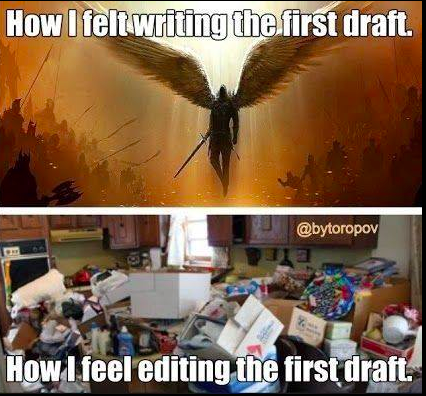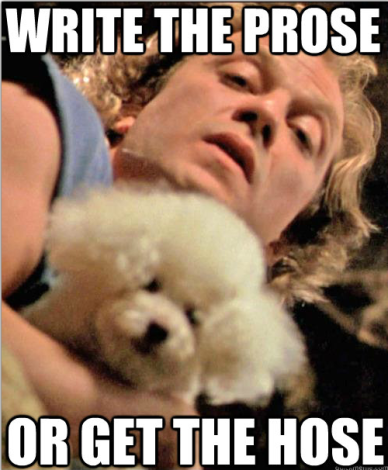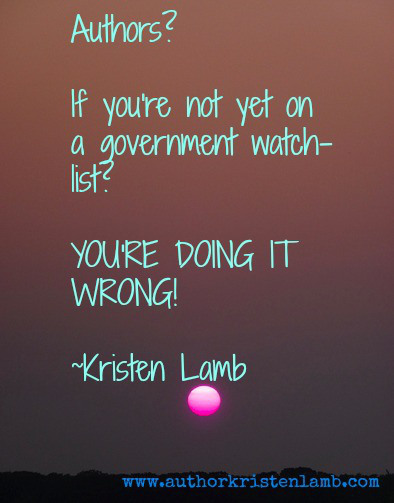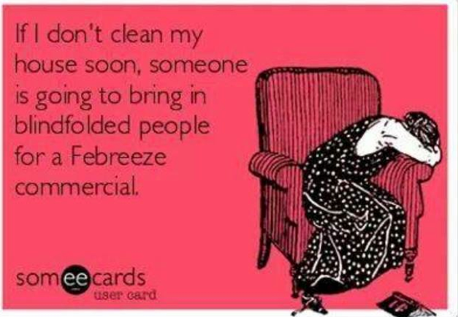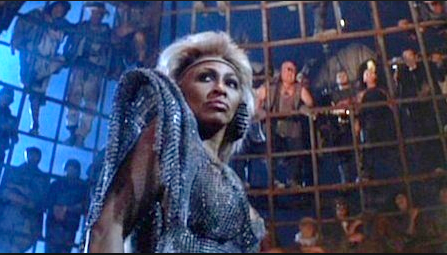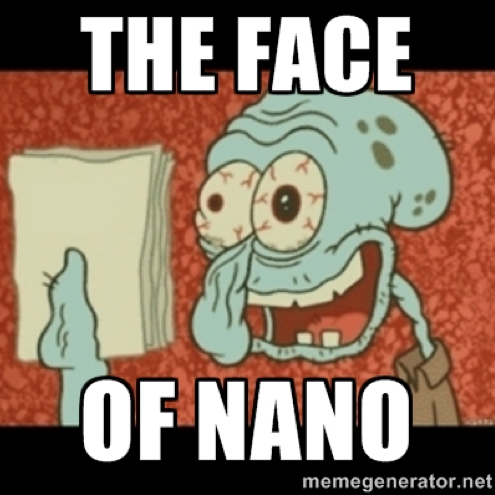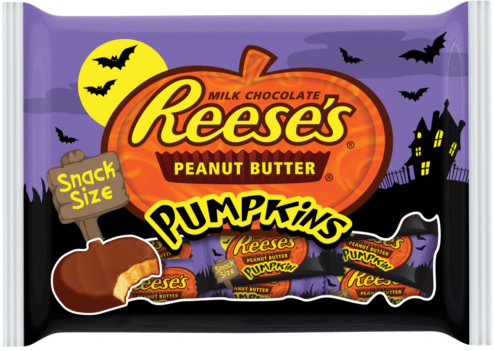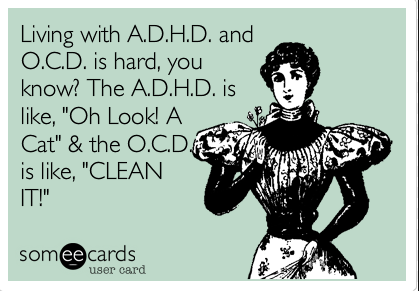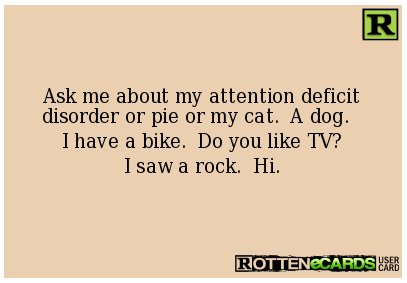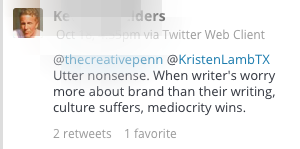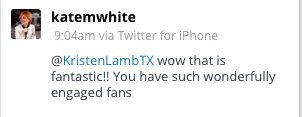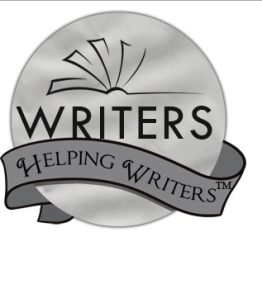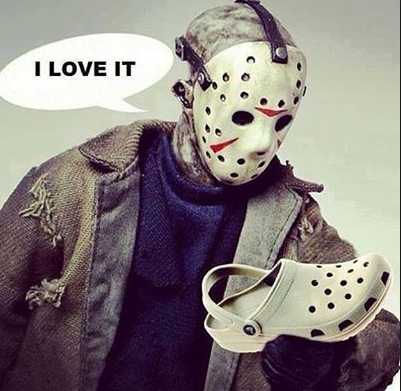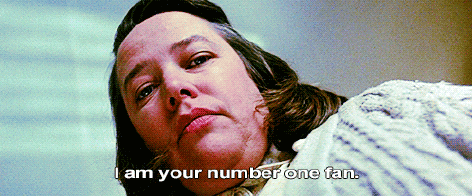Kristen Lamb's Blog, page 47
October 29, 2015
You Know You’re A Writer When….
So, I am gearing up for Nanowrimo and (of course) Hubby decides to get the flu because he is plotting against me and secretly doesn’t want me to succeed it is cold and flu season and this stuff just happens.
Poor thing.
Anyway, this means I was up all night long and have yet to go to sleep, but I did find a way to amuse myself between 1 and 4 a.m. before the fun hallucinations kicked in.
I found…THIS! Yeah, yeah, some of you have heard it before but it still cracks ME up and since I am here to amuse myself most of the time? Pthththththth. Haters gonna hate. Usually I do just fine blogging and writing in November, but just in case y’all don’t hear from me for a bit…
I figured I’d share since we all can use a good laugh before the real fun begins. And believe it or not, there are some people who have NOT heard my jokes. I know! Right? We should totally cure that. TODAY!
Anyway!
We writers are different *eye twitches* for sure, but the world would be SO boring without us. Am I the only person who watches Discovery ID and critiques the killers?
You are putting the body THERE? Do you just WANT to go to prison? Why did you STAB them? Helllooo? Blood spatter? LOO-Min-OL? Moron.
I think it’s a writer thing. So, since today I am staring at the “White Screen of I SUCK and Why Did I Want to Be a WRITER?”, we are just going to roll with it…
You Know You’re a Writer When…
You’ve learned that regular people are cute, and no longer get offended with this conversation.
Regular Person: What do you do?
Writer: I’m a writer.
Regular Person: No, I mean, what’s your real job?
You’ve come to understand that writers are a lot like unicorns. Everyone knows about them, they’ve simply never seen a REAL ONE.
You Know You’re a Writer When…
The NSA, CIA and FBI no longer bother with you. Likely, they know you by name and now outsource to the creepy ice cream truck to just make a few passes and check to make sure you’re still at your computer.
As an extra bonus, the next time the NSA passes by in the panel van? Go out and ask them for a job application and maybe even a reference if you want bonus smart@$$ points.
You Know You’re a Writer When…
Kind strangers hand you cash and sandwiches and offer to pray for you. Apparently you’re regularly mistaken for a homeless person because you haven’t bathed or changed clothes in weeks and are wandering around shouting at the air.
…aaaand, you are just doing Nanowrimo.
You Know You’re a Writer When…
You hate texting because it takes too long to use proper spelling, grammar and punctuation.
You Know You’re a Writer When…
You know what’s the best time of year to dispose of a body to confuse TOD and that seriously creeps out your friends and family.
And you know what TOD stands for and that creeps them out even more.
You Know You’re a Writer When…
You’re on such a roll with the WIP that you’ve forgotten a “real” world exists (including laundry). You’re down to wearing your husband’s socks and he’s either going commando or is forced to wear that thong given to him on his 40th birthday as a joke gift. The kids? Hell, they went feral a week ago.
You Know You’re a Writer When…
You take a break from writing to go to the store and, on the way, begin untangling a plot problem. You finally realize you’re in the next state and have no idea how you got there. But good news is, you now know which poison is best to kill off the character modeled after that cheerleader who bullied you through high school. It’s the poison that will make her fat and wrinkly before she dies slowly from terminal acne.
You Know You’re a Writer When…
You have NO CLUE what to do in case of a flood, a fire or a natural disaster, but you are actually looking forward to the collapse of civilization because you are pretty sure you will make an AWESOME Warlord.
You Know You’re a Writer When…
You appreciate that if Febreeze is good enough for the couch, why not hose the kids? Hey, you spent extra for the anti-microbial one. It kills germs *rolls eyes*. Now your tot smells like a Hawaiian Breeze and his cooties can’t hurt others. You should get a freaking MEDAL for this kind of creativity.
You Know You’re a Writer When…
You’ve been diagnosed with Tourette’s, Multiple-Personality Disorder or both. It’s tough to explain you were simply working out dialogue when strapped to a gurney. But the upside is when they sedate you, it’s the only vacation you’ve had in months and insurance might even cover it. SCORE!
You Know You’re a Writer When…
People believe you are a shy introvert, but you just can’t bring yourself to tell them that your imaginary friends are simply WAY more interesting.
You Know You’re a Writer When…
A casket washes up in a Houston flood and while normal people are upset how tragic it is, you are wondering if there is GOLD inside. Or missing drug money.
Or if they open open it, could they unwittingly unleash the ZOMBIE PLAGUE?
Or what if it is the WRONG BODY? And it was all to cover up a mob leader faking his own DEATH?
You Know You’re a Writer When…
You realize you are a horrible human being for getting so excited for that last one because NOW YOU HAVE A NEW STORY IDEA FOR NANO YOU SICK, SICK SOULLESS PERSON!
You Know You’re a Writer When…
“Recycling” is using the same jerks from real life in a new story. We can kill them AGAIN! :D
You Know You’re a Writer When…
You’re no longer invited to family events because they can’t take the incessant correction of their grammar.
Chickens are done, people are FINISHED.
You Know You’re a Writer When…
You’re automatically safe from any episode of Hoarders because when you get enough books? Others naturally assume you’re a LIBRARY. Hey, maybe you can apply for government funding. Scratch that. Then, you’d have to let people borrow your books.
You Know You’re a Writer When…
You willingly suffer frostbite hiding in a Costco freezer eavesdropping a couple’s fight, because dialogue that epic is worth a losing pinkie toe. Your coffee table’s already tried to assassinate it 342 times anyway.
You Know You’re a Writer When…
You’ve been mistaken for Gollum multiple times, because strangers found you in a dark corner whispering “My precious….” and it was just you and your Kindle.
You Know You’re a Writer When…
You plow over the entire Kardashian family, because OMG DEAN KOONTZ!
You Know You’re a Writer When…
Your idea of fun is reading the Diagnostic and Statistical Manual of Mental Disorders, talking to your friends at the Coroner’s office or reading/writing Amazon reviews of the Bic Pen for Her or the Hutzler 571 Banana Slicer.
You Know You’re a Writer When…
Speaking of the Hutzler 571 Banana Slicer, you actually bought one, not only to support the greatest comedic writing in human history, but also to screw with the TSA. Can you get it through airport security without a full-body search? Hide it near your shoulders and FREE NECK MASSAGE!
You Know You’re a Writer When…
You’ve made it onto the Mormon and Jehova’s Witness DO NOT CALL LIST because you will only promise to convert with purchase of YOUR BOOKS (and favorable 5-star reviews).
You Know You’re a Writer When…
Every time some overblown Third World dictator threatens to destabilize the world, all you can think is, “Pfft. Amateur.”
You Know You’re a Writer When…
It’s not a question of IF you will add your OWN to the comments…but WHEN… :D
I LOVE hearing from you!
To prove it and show my love, for the month of OCTOBER, everyone who leaves a comment I will put your name in a hat. If you comment and link back to my blog on your blog, you get your name in the hat twice. What do you win? The unvarnished truth from yours truly. I will pick a winner once a month and it will be a critique of the first 20 pages of your novel.
Also, please swing by my funny Jiu Jitsu post over at Dojo Diva. Get additional suck-up points brownie points and additional chances to win my contest (fewer comments means less competition and those comments are judged separately). I am blogging for my home dojo and your support will help the blog gain traction.
For those who need help building a platform and keeping it SIMPLE, pick up a copy of my latest social media/branding book Rise of the Machines—Human Authors in a Digital World on AMAZON, iBooks, or Nook.


October 28, 2015
The Single Best Way to FINISH Your Novel

Kristen’s New Author Pic
It’s my FAVORITE time of the year. I SO LOVE HALLOWEEN. It is the best of all the holidays because it is the only holiday where hanging out with family and cleaning my house are optional. There’s also candy and costumes.
This year I am going as Maleficent. Still working on my costume, and since I wasn’t sure I was going to be able to pull it off, I actually had a spare Alice in Wonderland costume.
#ThingsOnlyWritersAndPornStarsSay
So of course I had to put THAT to use. And, you are welcome!
Yes, I filmed myself as Alice in Wonderland in the only room in the house with lighting that didn’t make me look like Alice in Wonder-When-Botox-Will-Go-On-Sale Land. But, hey, we are all here to have FUN!
Anyway, whether we Nano or not, I want to offer you a lesson about writing a novel. Probably the BEST lesson. Editing is necessary and awesome. In fact, there are a lot of books published that could have used it…a LOT of it. But, like Botox, it can be overdone and ruin something that could have been beautiful.
Editing can and WILL kill your WIP. It WILL tank progress and, if you allow it, it WILL derail you and keep you from finishing Nano. In fact, I think perfecting and editing kill more novels than “writer’s block” ever did. We futz and fuss and fret the magic right out of the work until it dies a lonely death in a forgotten digital file on a forgotten laptop.
But how can we NOT edit? How can ignoring editing make our work better? Kristen, are you mad? What’s next? Cats and dogs living together?
It can. Trust me. Better yet. I’m an editor, so I will show and not tell.
I dig parables, so I have a good one for you.
I love to garden, but I am terrible at reading instructions, which means I am not going to read a How To book or gardening blogs, because I already have enough to read and this would steal time from my great joy…digging in the dirt. This means that, over the years, I’ve learned a lot through trial and error.
Code for : Killing Stuff
Almost seven years ago, we bought our first home. We got a sweet deal on it, but it needed work. The yard was little more than mowed field. I couldn’t wait to get in and pretty it up. I slaved for hours in triple-digit Texas heat digging holes and clearing land for gardens. I’d always loved oleander and when I found them on sale at the local nursery, I was ecstatic.
Normally, oleander this size were about $150 but I got each for less than $20. I planted one on each corner of the house and dreamed of how beautiful they’d be when they matured.
Then we had the most freakish, freezing winter in Texas history. I’d never even seen snow before and suddenly we were buried in eight inches of it.
The Canadians can all stop laughing now. You guys have things like PLOWS, SNOW SHOVELS, SNOW TIRES…and COATS.
Anyway, the oleanders that seemed to be doing okay during the mild fall were obliterated. When early spring came, I cleaned up all the dead stuff and dug out all the oleanders and threw them away. All except one because I ran out of energy.
Much to my horror, guess what sprouted once it got warmer?

I….LIVE….AGAIN!
My last remaining oleander. *sniffles*
To this day, I can’t look at that oleander without grieving the other four. I feel so foolish. What if I’d just been patient? What if I hadn’t been so quick to judge what was “dead”?
This is what premature editing can do to our story. When we start hacking away and digging stuff out too soon, we have no idea what treasures we might be tossing in the garbage.
Never underestimate what your subconscious is capable of doing. Our subconscious mind is planting seeds along the way that can eventually sprout into ideas better than we imagined. Editing too soon can ruin that magic and toss it in a Hefty bag, just like my poor oleanders.
Tips to Avoid Premature Editing
Fast Draft (Kinda Like Nano on Steroids)
Candace Havens teaches a method called Fast Draft and I use it to this day. You write the entire novel in a matter of two weeks. No stopping, no looking back. No editing. This is my preferred method, because I am notorious for editing stuff to death.
In the mystery I just sent off to an agent, I forbade content editing. There were times I thought what I was writing was ridiculous. SHEER MADNESS. But, as I got closer to the end, I realized my subconscious was far smarter than I was. I ended up with a richer, deeper story that I never would have been able to consciously plot. Because I didn’t uproot those seeds of inspiration, I was finally able to watch them bloom into something far more remarkable.
The killer I’d “plotted” was actually a red herring. My subconscious actually had come up with a twist even I didn’t consciously see. Had I gone back and “fixed” things? I would have edited out the best twist in my book.
Thus I challenge those of you who might have a tough time finishing. Give permission to simply WRITE. Your subconscious might have a miracle in store for you.
Limited Edit
Allow yourself to correct typos, punctuation and grammar ONLY. Anything else that you believe needs to be changed, make a note of it in a different color. Then keep moving forward.
I know this isn’t for everyone. Every time I talk about this topic, I get a half a dozen comments from people who just can’t bear to not edit. Of course, many of them don’t have finished books, either.
In the end, these are tips. You have to find what works for you. But I would at least give these methods a try. You can always slay the superfluous adverbs later ;).
Make Notes
If you are tempted to edit, instead, just make a note of it in a different color and keep going. For instance, maybe your protagonist didn’t have a sister when you started the book, then suddenly she does. You are tempted to edit this new character out. Instead of doing that, just make a note of it and riff with it. Your muse could be doing you a solid.
Writers often whine that they wish the muse would visit, but then when she does, they undo all her magic with edits. Let her help!
Remember that Nanowrimo is NOT about 50,000 perfect words so it is okay if there is a false trail in there. But if there IS, then you at least have some breadcrumbs to get you back on track and you haven’t wasted precious time polishing something that didn’t work OR unraveling something seriously cool your muse was gifting to you when you were refilling your vodka coffee ;).
Again, if you LOVE editing and you have finished 20 novels and bathe regularly in $50 bills, keep doing it. I am ALL about writers finding what works for them. There IS no One-Size-Fits-All.
But, if you’ve had a hard time finishing or you do get stuck, it doesn’t hurt to give this a try. I argued with pros who told me to stop editing my stuff for YEARS and I was stubborn as a goat (note the pic of me with the horns above—this is before I put ON my Maleficent costume ;) ). In all honesty, I really wish I hadn’t been such a stubborn pain in the @$$.
What are your thoughts? Have you ever gotten overzealous and edited the heart out of a story and later regretted it? What tactics do you use to keep from editing too soon? Does editing early not bother you?
I LOVE hearing from you!
To prove it and show my love, for the month of OCTOBER, everyone who leaves a comment I will put your name in a hat. If you comment and link back to my blog on your blog, you get your name in the hat twice. What do you win? The unvarnished truth from yours truly. I will pick a winner once a month and it will be a critique of the first 20 pages of your novel.
For those who need help building a platform and keeping it SIMPLE, pick up a copy of my latest social media/branding book Rise of the Machines—Human Authors in a Digital World on AMAZON, iBooks, or Nook.


October 23, 2015
In It to WIN It—Preparing for NANOWRIMO (National Novel Writing Month)
Today we are going to talk about a GLORIOUS time of year—NANOWRIMO—which stands for National Novel Writing Month. It is meant to support creativity and encourage those who say they want to be authors to give it a go and write a novel (50,000 words) in a month. Notice the challenge is 50,000 words. No one said they had to be good words. Or publishable words. Or polished words. Or edited words.
This is actually why I believe Nanowrimo is very useful for all levels of writers. It trains out perfectionism. No half-finished novel ever made the NY Times best-seller list, but some crappy slightly-less-than-glorious novels have. The biggest threats to your finished novel (and mine) are Mr. It Must Be Perfect and his evil sister Editina.
Preparing for Nanowrimo
Have Fun and Fuel Up
Anyway, whoever chose November as National Novel Writing Month was seriously brilliant, because Halloween is like Mardi Gras for writers. If you are smart, use trick-or-treating to your advantage. After combing the neighborhoods for bags of gooey corn syrup and chocolate morsels of literary energy, be a diligent parent.
Search your kid’s candy for stuff like “illicit drugs”, “poison” and “razor blades” and “get rid of it” which of course is code for “hide it in your office.” You will need that fuel for Week Two of Nano. Tape the pixie sticks under your desk in case this goes into Week Four.
You see anything that looks like THIS? It’s drugs. Confiscate it!
Because seriously, who’s giving their Adderall away for FREE to complete and total strangers? *rolls eyes*
No…really. I need an address.
Where were we?
Technically, taking half our kids’ candy under false pretenses is gas-lighting them, but reading and literature is vital for a civilized society. The world needs more writers and normal people make crappy writers. It’s science. So how are we going to create more literary geniuses if we don’t damage our kids just a little bit?
You’re welcome.
True, years later our kids might wonder why we continued to live in a neighborhood full of psychopaths who tried to murder them every time they trick-or-treated. And they may put two-and-two together that their lives were only “in danger” the years Mommy or Daddy did Nano. But, by then, we will be a filthy rich NYTBSA and we can buy them all the candy they want to take to therapy.
OR we can team up on our grandkids because the plan was successful and our kids grew up to become writers!
I am a freaking genius.
And if you don’t have kids? Well…yeah, sucks to be you. You’ll have to pay for your own sugar rush.
Some More Practical Tips (Other than Crockpots & Yoga Pants)
Often why writers fail to finish Nanowrimo is they don’t do the right prep work or enough prep work. They believe that they will make it through 50,000 words on creativity alone and that’s like thinking a Share-Size bag of Skittles is plenty of fuel for a double marathon.
Uh huh.
BS and glitter is good for about a day. Maybe three. After that? $#!t gets real and if we haven’t done some preparation it’s going to make finishing a lot tougher, if not impossible.
I highly recommend doing Nano. Nanowrimo gives a taste of the professional pace. It also gives a sample of the professional life of a writer (especially the weeping and drinking heavily part right around November 30th).
Most of the time we (pros) do not feel inspired. If we felt inspired all the time and were a limitless-cerebral-slushee-machine-of-cherry-flavored-rainbow-imagination-genius, no one would have ever needed to invent this thing called a deadline.
And then call it something super terrifying like DEADline.
Nano Makes it REAL
Nanowrimo gets us over our romanticized notions of “writing” and lets us fall in love with the real deal. A “WIP” (Work in Progress) does not send you dozens of roses, run you bubble baths or give you long massages.
Your WIP has no idea what a hamper is, eats the last slice of pizza and leaves the box in the fridge, farts under the covers and yells DUTCH OVEN! and shoves your head under the covers. You stick with it and love it through disease plot holes sickness adverb infestations, and infidelity revision until death—deadline—do you part.
THAT is reality. THAT is being a real writer ;) .
You can do it!
What makes it easier is we learn how to rely on skills instead of just creativity because creativity will wear out pretty quickly.
Yes, many of you were star students in school. I was too. I made As on all my papers. But, unless you had a teacher that who you turn in a paper 50,000 words long? Trust me, this is a whole new world and some preparation is going to go a LONG way toward helping you finish.
Also, I want for you to do more than finish. I want to help you create something that can actually be shaped into something worthy of publishing.
If we are going to half-kill ourselves, why not?
To help you do this, I’ve linked to one of my most popular series:
Anatomy of a Best-Selling Novel
This series is a crash course in all you need to write a novel. I go over plotting on the micro and macro scale. We discuss three-act structure, etc. etc. No, it will not make your writing “formulaic.” Formulaic writing comes from execution. This series is valuable whether you are a plotter or a pantser or somewhere in between.
I call myself a plotter :D .
There is NO way I am ever going to outline, so I am not quite a plotter. I love the freedom of being a pantser (writing by the seat of my pants). But, pure pantsing is grossly ineffective (my opinion). It is a really good way to stall and it will be a nightmare to revise.
Even if you feel you are a pantser, I recommend checking out the series. Give some plotting a try. The reason. Creativity is ignited with boundaries. We love to believe that boundaries stifle our creativity, but I strongly disagree and I will prove it.
Visit Alcatraz. People incarcerated in supermax prisons are SERIOUSLY creative.
Okay, a better example…FINE.
If I said right now, “Write me a 1000 word short story.” Most of you would either blank or would stall.
BUT, if I said, “Write me a 1000 word short story about a freak show.” POOF! Ideas would abound. With just a little bit of boundaries your imagination sparks to life.
We can still write freely, but a handful of guideposts can keep us on track and can help maintain momentum.
The Series in Order:
Anatomy of a Best-Selling Story-Structure Part One
Anatomy of a Best-Selling Story-Structure Part Two
Introducing the Opposition-Structure Part Three
Is Your Story Idea STRONG Enough? Part Four
Your Story in a Sentence-Part Five
Is Your Story Primal? Part Six
How to Manage Scenes in a Novel-Part Eight
Which is the Best POV for YOUR Story? Part Nine
Of course I recommend reading all of these, but if you do have to choose one, Part Four is a good one. A major reason many people do not complete Nano is they select far too weak of a story idea. The idea might work for a short story, but it simply is not robust enough for something as long as a novel. Thus it fizzles.
If you pick two to read? Go for Part Three as well. The single largest problem most new writers have is they DO NOT properly understand the antagonist. No antagonist? No story. Waxing rhapsodic for 50,000 words is not a novel. Navel-gazing is not a novel. Bouncing back and forth in time is not a novel. Novels are about one thing and one thing only—trouble. Without an antagonist your story will collapse in on itself.
Well, there you have it. Enjoy the rest of your October. Live it up kiddies while you can. You can sign up for Nanowrimo HERE.
I am still undecided if I’m going to do it. I usually do. I will be fast-drafting a NF I have due to my publisher, but I don’t know if I want to do a fiction at the same time, though I’ve done it before. AND, I have bombed Nano (multiple times), so I’m not perfect. When I blew it it’s because I failed to prepare. Fail to plan plan to fail. When I did prepare, however, I finished in 12 days. So it DOES make a difference.
So, you going to Nano? Were you going to pass but now the peer pressure is getting to you? Have you ever completed Nano? What helped you finish? What was your best time? Or did you sneak in at 11:59 P.M. November 30? Do you think plotters have an advantage in Nano? Are you a plotter or a pantser? Or a plotser?
Planning on confiscating “drugs” from your kids trick-or-treat bags?
I LOVE hearing from you!
To prove it and show my love, for the month of OCTOBER, everyone who leaves a comment I will put your name in a hat. If you comment and link back to my blog on your blog, you get your name in the hat twice. What do you win? The unvarnished truth from yours truly. I will pick a winner once a month and it will be a critique of the first 20 pages of your novel.
For those who need help building a platform and keeping it SIMPLE, pick up a copy of my latest social media/branding book Rise of the Machines—Human Authors in a Digital World on AMAZON, iBooks, or Nook.


October 21, 2015
10 Ways for ADD Writers to STAR WARS! …Be More Productive
Other writers frequently ask how I somehow manage to get a lot of stuff done, despite my having the attention span of a ferret…with a bad crack habit. Here are 10 ways to help you be productive even if OOH! SHINY!
…even if you tend to be a tad majorly ADD. The following tips are what help ME stay focused. I am NOT a doctor or psychologist or ADD expert. I’m a Jedi master, warp engine inspector, and WRITER so you get what you get.
We’ve been talking this week about how to be able to do all it takes to not only be a digital age author, but to freaking ROCK IT while we are here. Truthfully, the explosion of social media is just proof to me that ADD people will rule the world…which probably explains all those “End of the World” prophesies.
In the meantime? We have dreams and deadlines and most of us have grown fond of clean clothes. Also, our family is all needy and whiny and says things like, “Mommy, why is there no food?” “Daddy, why won’t the lights turn on?” “Honey, why are there people living in our basement?”
*rolls eyes*
Can you say “high maintenance”?
OKAY, so tips…
1. Make lists.
I get distracted easily, so a list reminds me of what I need to get accomplished. I make separate lists—housework, fiction, non-fiction, business stuff, global domination using sea monkeys. Then, once I have the list, I do the hardest thing on my writing and business lists FIRST (housework can WAIT).
Like Covey says, Never mistake the urgent for the important.
I also add stuff to the list I’ve already done…just so I can cross it out because it makes me smile and feel SUPER accomplished. Don’t judge me because you do it, too.
2. Understand that feelings are narcissists and pathological liars.
Writing is a profession, not a playpen. Professionals ignore their feelings and do it anyway. Only children, amateurs and The Long Island Medium listen to their feelings. Feelings are fickle, lazy, and secretly jealous of your work and a tad pissed that you no longer hang out with them as much as you used to. The secret to success is to work your tail off. Be willing get up earlier and stay up later than others. Be willing to do what others won’t.
But I wanna write books. I don’t wanna do social media, toooooo. It’s haaaaard.
Yes. It is. There are many reasons this profession is not for everyone.
3. Use The Force…of self-discipline.
Who cares HOW you get things done, so long as they get done?
I use the “Swiss Cheese” approach. I have my list and I take bite after bite after bite until the work is finished. Every book can be written in 250, 500, or 1,000 word bites. I CANNOT work linearly, so I don’t try and yes I was always in trouble in school but public schools were designed to train factory workers and corporate mind slaves, not people who get paid to play with imaginary friends.
4. Mix it up.
I am a writer, wife, entrepreneur, teacher, and mom who has yet to make enough money to afford servants (which sucks), and cats make lousy slaves. This means I get to do most of the cooking, cleaning, laundry and housework. Write your 200 words, fold a load of whites, empty the dishwasher, then write another 200 words.
5. Suck it up, buttercup.
Understand that sometimes we will have to sit for a long time and focus. It’s hard. Whaaaaaaahhhhh, but anyone who thinks being a writer is a fluffy hamster dream has been hanging out with their feelings…and feelings lie, sabotage and will talk you into living on ice cream and cookie sprinkles.
6. Make mean writer friends.
Yes, the Swiss Cheese approach works well for people with ADD, and yes, there are times we need to duct tape our a$$es to the chair. This is why I befriend really mean people who kinda scare me. On the surface they are funny and sweet and would do anything for a friend…but that’s the issue. They will do anything for a friend, including ordering a hit on my X-Box 360.
7. Ditch loser friends.
We all have them or have had them. People who like to complain, make excuses, indulge in their feelings all the time. People who have a new dream every other week. I wanna be an astronaut, no a writer, no a vacuum salesman, no a journalist!
Ditch writers (and other people) who believe in luck, not work. Laziness, apathy, and whining are contagious. Treat excuses like EBOLA. A friend coughs blood excuses all over you, and, within two to three days, you start coughing up blood excuses, too…until your dream of being a writer liquifies and bleeds out and I hope you’re happy with yourself.
Killer.
8. Forget perfection.
Perfection is an urban legend, started by Feelings (because Feelings are a needy boyfriend/girlfriend who don’t understand the world does not revolve around them.) The world doesn’t reward perfection; it rewards finishers. Often we lose focus on what we are REALLY doing, because we are getting sidetracked with nitpicking.
9. Exercise.
Often ADD can be fueled by being too sedentary. Human bodies were not designed to sit on their @$$e$ all day. Ever have a puppy that chews everything and is into everything and short of strapping itself to a rocket is just being a GIANT PAIN IN THE @$$?
How do you get it to behave? Put on roller blades and run puppy until puppy wants to slip into something more comfortable…like a coma. ADD people are human puppies, so stop piddling on the carpet…I mean, go get a little exercise and your focus will generally improve.
Four times a week I go to Jiu Jitsu and roll around on the mats and inflict pain on large men. Sure, it is probably Freudian, but it is also fun and it helps keep the joints loose and the mind calm.
10. Drink lots of water. The clear stuff. That stuff from the faucet.
Human bodies are a hydroelectric system, and water enhances conductivity. Cool writer ideas/thoughts work this way. Muse Pixies of Awesomeness are conducted through your brain to your fingers and they bring the cool story stuff. MPAs like to travel via fairy, or ferry on WATER. They can’t travel if the waterways are too dry and moor them on a cookie sprinkle…and then you can’t focus.
It’s science. Don’t argue.
Must…get…off…Instagram…..
BONUS TIP #11 MULTI-TASK YOUR A$$ OFF!
Some experts say multitasking doesn’t work and that is simply because they suck at it.
Multitasking is awesome for ADD people namely because by definition we need at least two simultaneous activities to talk our brain into cooperating. Why some people suck at multitasking is 1) they have a normal boring brain that needs time to buffer or 2) they pick the wrong activities to pair together.
BAD IDEA: Using a chainsaw to clear deadwood while doing baby-mommy yoga.
GOOD IDEA: Listening to soundtrack to American Horror Story while clearing deadwood and making mental notes of the feel of chainsaw for future use in stories.
I’ll give an example of a great way to multitask. As writers, READING is a huge part of our job. I can almost instantly tell writers who don’t read, mostly because their writing sucks.
Audio books are our friend. I inhale audio books while folding laundry or doing mundane but necessary chores like taxes dishes.
Thing is, pair one rote activity with one that you need to do that will engage and develop your creative brain. It’s about working smarter, not harder. And, since your ADD brain likes to paint the cat when you aren’t looking, giving it story time keeps it happy and engaged and out of trouble.
What about you guys? Those of you ADD folk out there who’ve paid attention to this point, first of all, CONGRATULATIONS!!!
…now back in your hole.
It writes the words or it gets the hose O_o.
What are your thoughts? Struggles? Tips? Words of wisdom. It’s okay. You have permission to get back in your hole after you comment :D.
It rubs the elbow grease on. IT RUBS THE ELBOW GREASE ON! *pets fluffy white dog*
I LOVE hearing from you!
To prove it and show my love, for the month of OCTOBER, everyone who leaves a comment I will put your name in a hat. If you comment and link back to my blog on your blog, you get your name in the hat twice. What do you win? The unvarnished truth from yours truly. I will pick a winner once a month and it will be a critique of the first 20 pages of your novel.
For those who need help building a platform and keeping it SIMPLE, pick up a copy of my latest social media/branding book Rise of the Machines—Human Authors in a Digital World on AMAZON, iBooks, or Nook.


October 19, 2015
3 Ways to Fire Up Your Writing Career Today
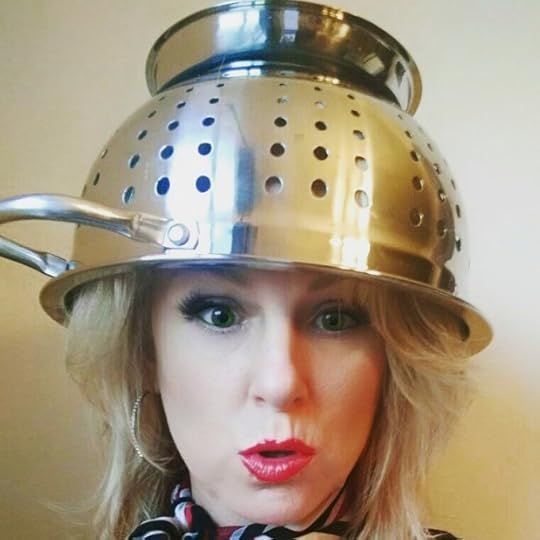
My impression of writers on social media…. #tinfoilhat
I am an “Old Dog” of the digital publishing paradigm. When I started out on social media, I did not want to be a social media expert. I enjoyed editing and teaching and longed to write fiction. But every a$$clown with a Twitter handle was a “Social Media Expert” and much of the teaching was nothing short of ridiculous.
Some of the advice was downright predatory (or, in my book, cheating).
In my estimation, most of the tactics were more likely to increase author suicide rates than book sales, so I finally decided to become a Social Media Expert Jedi ;) .
I’ve been through all the fads. The FREE BOOK Rush of 2010, The Great .99 Book Deal of 2011, The Amazing Algorithmic Alchemy, The Magical Metrics and the Automation Invasion of 2012-2014 (there are still skirmishes along the front).
Guess what? I’m still here.
I don’t say this really to brag as much as to make a point. Social media, done properly is not a short-term burst of gimmicky energy. There is no magic to it and it while it is simple, that doesn’t mean it’s easy. We not only have to manage the brand, we also produce the product.
Not a job for the faint of heart.
And with all the tweeting and blogging and slogging month after month and year after year, I know that it is SUPER easy for us writers to get overwhelmed. That’s why today, I’m here to offer some simple ways to inject fire back into your writing and your career.
*plays Eye of the Tiger loudly* *punches at the air*
#1—Appreciate that Writing and Social Media Branding Can Coexist
When I am on Twitter, I often get tweets like these:
Guess what? I agree! The writing always, always comes first. But why is there an almost automatic assumption we must choose?
Social media, done the way I teach in Rise of the Machines, takes maybe 10-15 minutes a day and feel free to take off weekends. I offer no get-rich-quick advice. My author platforms take time (and discipline) to build, but they are virtually indestructible.
And the writer who tells me she doesn’t have ten minutes a day to work on her brand isn’t serious about being successful.
Whether we like it or not, social media is necessary for our job. Yes writing is fun, but it is still a profession.
Writers are in the entertainment business. Note that half that word is business. We are in the business of selling books. When I was in sales, we had a saying. Fish where the fish are. And the fish are schooling on social media. Makes sense to drop some lines.
The writer who is willing to tackle doing social media well is making a transition from hobbyist to professional. Celebrate! This means you are going places!
Thus, if the career has been sluggish, it might be time to go polish some other types of skills that are now required in this profession. Many times, the problem isn’t with the tool. We simply don’t know how to use that tool well.
#2—YES!!! The Product is All that Matters
When it comes to a brand, the surface perception is only part of the equation. I can have a fabulous website, great author pics, charming tweets and be a downright likable gal, but if my books stink?
No amount of social media magic can salvage literary dog poo.
This is one of the reasons I have written over 900 blogs. I blog a lot on craft because the product is essential. It is the most important part of the equation. Yes, write first. Take classes. Hone your art. Because your social media brand must be able to deliver an excellent product. It is okay to believe that your writing is important because…it IS.
So yes, we do need to work on our platform but you do have my “expert” opinion to focus on that end product. Relax about the social media, stuff. Really.
#3—Embrace the Social Media Trickle Down Effect
Part of embracing the new type of work we must do as digital age writers comes with redefining how we see our work. Feel free to get on social media and trudge through it like some chore, but with that kind of an attitude? I recommend just staying off altogether. We can sense a poor attitude through the screen.
Instead, I recommend you reframe what you’re doing and how beneficial that time really is. It’s an investment in you, in your success beyond simply selling books. There are all kinds of other benefits many writers never even consider.
Networking
Virtually every profession benefits from professional networking, why would writing be any different? Where else can you have 24 hour access to publishing professionals all over the world? Follow your heroes and make them mentors. What are they reading? What are they doing? How do they manage their time?
Where else other than Twitter could I start my day chatting with the former editor of Cosmopolitan Magazine (and one of my FAVORITE authors)?
I used Twitter to follow James Rollins. It’s how I got to know him well enough to eventually contact him about giving me a blurb for my second book.
While an in-person writing group is great, often they can be a bit heavy with new writers. Places like Twitter or Facebook allow us access to the seasoned pros. We can chat with people we’d have to otherwise wait a year or more to see at a conference. Take advantage!
Research
Every writer out there gripes about not having enough time to write. Okay. Twitter helps us work smarter not harder. Twitter can make research much faster and far more accurate.
For instance, if you want to write a sexy new story with a Navy SEAL and don’t want to lose weeks researching, hop onto #NAVY and make some connections. Experts are always eager to help writers get the facts correct. The fastest and easiest way to find them?
Twitter.
Being Brave
And, for the shy folks, I know social media is forcing you to do something afraid. That is good. Use this time to hone being brave. Be brave in the small moments on-line and it might make you braver in your writing.
In the end, remember that there are mega-successful authors who are using social media to reap major advantages. This notion that we must choose writing or networking is short-sighted and an excuse. We all must learn simply to use time well and be disciplined.
If we assume that platform-building is this awful horrible time-intensive thing, then we psych ourselves out of some truly fantastic benefits that can really fire up our careers. We have to remember that it is very possible to write books and be on social media. Just like we can bathe and brush our teeth. No need to choose ;) .
What are your thoughts? Do you psych yourself out when it comes to branding and social media? Do you think you need to do everything? Do you see how social media can allow you to take simple steps to fire up your future? What are some ways you add some mojo back into your routine?
I LOVE hearing from you!
To prove it and show my love, for the month of OCTOBER, everyone who leaves a comment I will put your name in a hat. If you comment and link back to my blog on your blog, you get your name in the hat twice. What do you win? The unvarnished truth from yours truly. I will pick a winner once a month and it will be a critique of the first 20 pages of your novel.
For those who need help building a platform and keeping it SIMPLE, pick up a copy of my latest social media/branding book Rise of the Machines—Human Authors in a Digital World on AMAZON, iBooks, or Nook.


October 15, 2015
Three Reasons Your Writing Career is Stuck

Original Image via Flickr Creative Commons, courtesy of Mike Spasoff
Writing is a uniquely difficult profession for more than a number of reasons. There are a lot of things we could have chosen to do that would have been easier. For instance, discovering life on Mars, developing telepathy, or inventing gluten-free dairy-free calorie-free carb-free pizza that smooths wrinkles the more slices you eat.
:D
There are days that even I go. Really, Kristen? You HAD to be a writer? You could have been a brain surgeon by now.
Then my muse comes back and says, “What? And take the EASY way out?”
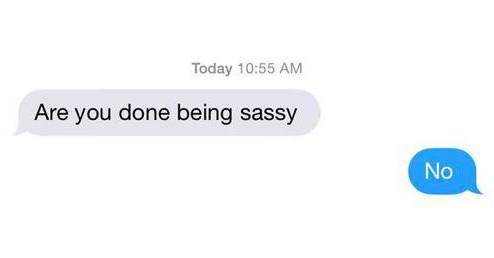
Me and my Muse
This is a tough tough job and I am here to let you know…
It never gets easier.
Ever.
It’s like Space Invaders. It just gets faster and faster and harder and harder…until you DIE.
Or give up.
You’re welcome.
This is why we must do this job because we love it. Writing is not a profession we get into for any other reason other than we have a passion for one thing…writing. I’ve experienced many levels of being an author. I’ve been the wide-eyed teenager in a bookstore spending babysitting money on a copy of Writer’s Digest Magazine because one day I was going to be a writer.
I’ve been a brand new writer who had no clue that POV did not mean Prisoners of Vietnam.
I’ve graduated from being so clueless I didn’t even realize how clueless I was to being someone who writes full time, travels the country speaking to hundreds of people. I’ve written almost a thousand blogs and have three books under my belt. Five if we count the two that are not yet published.
Fifteen if we count all of those that the State Department has locked at the CDC.
This is all to say that, at some point, I’ve been where most of you are now. In my last post, Good Girls Don’t Become Best-Sellers I talked about how imperative it is that we CALL ourselves a writer, that we USE our names. There is no aspiring. When we hide behind cutesy monikers and avatars and call ourselves “aspiring” writers we are being chicken$#!t.
*If you didn’t know better, it is okay. I did it too ((HUGS))*
Fortune favors the bold.
But what happens if you have been bold? Maybe you are calling yourself a writer and you are blogging (mostly) and you just have hit a slump that you just can’t seem to get out of. Having been at this for many years, I will tell you it happens. Success is not a straight shot up and to the right.
This is why I loathe the term aspiring writer with the power of a thousand suns. Aspiring is a poseur. Aspiring wears a beret and quotes Keates in a phony accent and drinks too many cappuccinos then walks the check. Aspiring is a fake and a flake. Aspiring won’t be there in the dark night of the soul when the blood runs freely and you’re holding your own guts. Aspiring is a literary booty call and a book baby daddy. Aspiring wants all of the benefits of a “relationship” with none of the sacrifice.
The thing is, “aspiring writers” never get stuck any more that a unicorn gets stuck because a unicorn isn’t a real animal and an aspiring writer isn’t a real writer and only real writers get stuck.
And yeah, I know I just made myself about as popular as a clown at a funeral for that one, but the aspiring writers will all be too lazy or chicken to blog about it.
Now that we are left with the writers. You will get stuck and today we’ll talk about three main reasons why.
You are Still Trying to Find the Time
This happens a lot especially in the beginning of your career, especially if you are unaware of that nonsense about calling yourself “aspiring.” If you desire to be PAID for your writing then you are no longer a hobbyist, you are a writer. This means this is a job. Granted, what level of job is going to be up to you. It must be congruent with your goals.
This said, time is not loose change lying around in the couch cushions with the Cheerios and the remote control. We don’t find time, we make time. If you were attending law school, would you have to “find time” for that? If someone told you today that a NYC agent had a deal ready to sign along with a check for a sweet advance, would you wonder if you could find the time to make the meeting?
If we don’t take ourselves seriously no one else will.
Decide how much time you require to meet your goal and then everything else is scheduled around THAT.
You Aim to Please
People please, that is. I hate saying this, but I have struggled with being a notorious people-pleaser. I’ve bordered on an almost pathological need to be liked. Still do. When I was starting out, everything came before my writing. My brother and sister-in-law would drop off their young children for me to watch because I didn’t have a real job.
My mom would interrupt and expect me to take her shopping or help her paint or run errands. Everyone felt they had carte blanche to part out my day because I wasn’t doing anything anyway.
Then, later when I joined a critique group, every time someone didn’t like something, I’d change it to make them happy. Pretty soon, what probably was a good (albeit newbie story) was a Franken-novel beyond repair.
When I began blogging, the second a commenter said something negative, I’d change whatever the “offense” was. Or, I’d make my content “tamer”. Guess what I’ve learned?
Your family can find other friends and babysitters. No one wants to publish a Franken-novel and no one cares about milk toast blogs.
Why the aspiring writer is such a loathsome creature is that writers are mysterious and glamorous for good reasons. We are brave and daring and we say all the stuff that mere mortals wish they had the stones to SAY and yet we actually write and then sign our freaking name to.
Aspiring writers want to wear a purple heart when they’ve never left home, let alone been shot.
Real writers cannot be liked all the time by everyone. So, if you are stuck, it is likely you are trying too hard to be liked. Guess what? Some folks on Facebook were offended by my post Good Girls Don’t Become Best-Sellers because I didn’t include men. Well, I didn’t include iguanas or african pygmy goats either. Sorry. The blog is only so long and there are brave bold Bad Girl Guys who apparently had no trouble reading between the lines and are smart enough to think in metaphors. The rest? They are not my audience.
You Are Thin-Skinned
We all start out as baby writers and just like babies, we all start with baby soft skin. But this is a tough business and we need to put ourselves out there to toughen it up. And YES, it SUCKS! I remember the first time I attended a critique group. I cried for an hour in the parking lot and nearly ODed on Twinkies.
One of the reasons I love for writers to blog is that a blog is the ideal form of social media for writers, and in my book I teach how to do it well. Blogging plays to our strengths. Writers WRITE.
Who cares if our blog never goes viral or no one reads it? In the meantime, a blog makes you commit to a deadline. It trains you for a professional pace and puts you in a professional mindset. WRITERS WRITE.
A blog forces you to put yourself out there, to brave critique. And yes, there are trolls and we have to learn to handle them because they do no go away when we publish, they only get worse. You do not want to wait to develop thick skin once the book is out. TRUST me on that.
I was stuck for years because I was writing for the wrong reasons. I was writing because I was insecure and I needed to hear a non-stop outpouring of praise. Anything counter to that, I couldn’t handle. It made me give up. It wasn’t until I deliberately placed myself in the crucible that I began to toughen up and I started to really grow as a professional.
Very often we are stuck because we fear pain. We are experiencing pain because we have thin skin. The only way to get thicker skin is to brave pain. Place yourself where you are bound to grow the most. When I was new, I had all kinds of friends who eagerly told me that my writing was better than kitten hugs, but I knew I needed to win over the person who was the toughest to impress.
If you find a really great writing group, you know who I am talking about. Maybe invest in a writing class. Treat yourself to a Death Star Treatment with me *evil laugh*. Find an editor you respect. Don’t wait until you have to find the money to get a full edit. Get 50 pages and pay them to shred you so you don’t waste time and money on an unpublishable mess. We don’t grow unless we embrace the pain.
All three of these stumbling blocks boil down to making this profession (making YOURSELF) a priority. Time is what we make of it. When we try to please everyone, we please no one. We need to suck it up and writer up.
What are your thoughts? Do you let friends and family part our your time? Do you let them take far too much control over your schedule? Are you afraid of making waves? Do you try too hard to keep the peace and only end up resentful? OR? Are you a ROCKSTAR at putting down boundaries? What are YOUR secrets or tips? Do you struggle with being thin-skinned? Are you terrified of putting yourself out there?
I LOVE hearing from you!
To prove it and show my love, for the month of OCTOBER, everyone who leaves a comment I will put your name in a hat. If you comment and link back to my blog on your blog, you get your name in the hat twice. What do you win? The unvarnished truth from yours truly. I will pick a winner once a month and it will be a critique of the first 20 pages of your novel.
For those who need help building a platform and keeping it SIMPLE, pick up a copy of my latest social media/branding book Rise of the Machines—Human Authors in a Digital World on AMAZON, iBooks, or Nook.


October 8, 2015
Making Story MAGIC—How To Bring the Elements All Together

Original image via Flickr Creative Commons courtesy of Sodanie Chea
I love to think of myself as having a special eye for talent, and when I find gems like Angela Ackerman and Becca Puglisi, it just makes a gal go “SQUEEEE!” I’ve been following these ladies for a loooong time since they were relatively new in their careers.
These days?
Back up because they are a powerhouse and they offer up some of the most excellent writing instruction in the business. They are the authors of the legendary Emotion Thesaurus which eventually gave rise to stacks of other writing tools (I recommend and use them ALL) and now they are launching something truly special.
And, since they are rockstars, they have given me, the W.A.N.A. Mama a very cool deal to share with you guys at the end of this post. This is HUGE! This is the new state-of -the-art-site every writer needs. One place for all the tools we use, and Becca is here to tell us some more about how One Stop will help you reach your dreams and how to get it. You need this. You deserve it. NaNo is coming. You will thank me later ;) .
But, the best editors will always say, show don’t tell so this isn’t simply a sales pitch. Becca is here to talk about how story elements must work together and then use that to introduce how One Stop helps make that happen (and then the super sweet deal) …
Take it away Becca!
***
When it comes to writing a successful story, people tend to think in terms of two elements: plot and characters. Obviously, these are incredibly important, and if you want to write a story that readers will appreciate, you’ve got to get these two pieces right.
But there’s so much more to a good story: setting, symbolism, theme, emotion, voice. And as important as it is to do all of these things well, it’s just as important that they fit together.
Look at The Lord of the Rings trilogy. Characterization is a huge part of this story—particularly for the hobbits. The opening scene is Bilbo’s birthday party, and we see right off that hobbits in general are fun-loving, laidback foodie types who like their tankards almost as much as their pipes.
But it’s difficult to define this people-group without also referencing The Shire.
Their passion for this place, their organic connection to the hills and rivers and trees: Tolkien didn’t just pick a setting out of thin air. He created one that fits with the characters like a missing puzzle piece. The characters and the setting go hand in hand; you can’t imagine one without the other.
Which is why, when evil arrives, Frodo’s decision to take it far away and preserve the Shire is a no-brainer.
I find it interesting that the symbol for evil is a gold ring: something that really has nothing in common with the hobbits or their home. They’re simple people; yes they have whole rooms devoted to clothes and they’re proud of their residences, but gold and silver and coins aren’t a huge deal to them.
Tolkien could have used anything to represent evil in his story, but he chose something that had nothing whatsoever to do with The Shire. In doing so, he showed the Shire’s goodness and wholesomeness and the need for its preservation.
I could go on about other writing elements and how they all fit together to make a beautiful, resonant whole, but I think you get the picture. Very likely, none of us are present-day Tolkiens, but his work is the perfect study for how various elements aren’t only successful in isolation; they’re amazing in the way that they work together.
So how do we do accomplish this in our own writing?
Choose Thoughtfully
When it comes to the various elements of a story, it’s tempting to go with the things that excite us as writers: settings we’ve visited, character traits that we embrace, symbolic trinkets and knickknacks that speak to us. And while those things may work, they probably won’t be the best choices for our stories. When it comes to any writing element, don’t choose randomly. Ask yourself: What makes sense for my character and the story? This is the way to make sure that the elements you choose are the best possible fit.
Start With Characterization
I know, I know. Not every author or story is character-driven. But if you’re looking for ways to tie your elements together, the main character is a good starting point.
For instance, let’s say you’re trying to figure out the setting for an important scene. You could just pick one at random—a restaurant, the school cafeteria, an old barn, etc.—but your scene will have more impact if the setting ties in with your character.
Narrow down the virtually endless set of options by asking these questions: What locations have special significance for my character? What setting is emotionally charged for him or her? By choosing a setting to which your character is already connected, it comes with the potential for tension and high emotion—both of which are good for sustaining reader interest and building empathy.
Symbolism is another element that can be tied to characterization for added effect. In Great Expectations, the stopped clocks in Miss Havisham’s house symbolize her abandonment at the altar—the moment when her life essentially stopped.
Dickens didn’t choose a random, external object for this; he chose a specific time, down to the minute—an intensely personal symbol to represent the most formative event from Miss Havisham’s past. This is a great example of how choosing symbols that are personal to the character can add oomph to a story.
Know Your Characters Well
If you want to bring all the story elements together and you’d like to use a character as the centerpiece, it’s imperative that you know that character well. You don’t have to know every little thing about her; but you do need to have a clear understanding of the important parts of her past so you’ll know not only the kind of person she is in your current story, but also what objects, settings, ideas, and events are going to move her.
For a number of resources on building and understanding your character’s backstory, check out the Writers Helping Writers Tools page.
Bringing all of these elements together can seem daunting. But if you start with a solid working knowledge of your character’s backstory and who he or she is today, you’ll be able to move forward from there.
Once you’ve got that basic knowledge down and you’re ready to bring it all together, you might consider visiting One Stop For Writers. This new online library, dreamed up by Angela Ackerman, Lee Powell (creator of Scrivener for Windows) and me, is full of one-of-a-kind resources to help with various aspects of storytelling.
Its unique thesaurus collection covers symbolism, character traits, emotions, physical features, settings, and more—and it’s all cross-referenced and searchable, making it easier to tie all of these pieces together in a way that makes sense for your story and will resonate with your readers.
Most of us probably don’t aspire to be the next Tolkien or Dickens. But that doesn’t mean we can’t learn from their brilliance. Know your characters well. Choose your elements thoughtfully, and whenever possible, tie them in with your character and your story. If you can do these things, your work will be much tighter and will ring true with readers, which hopefully will lead to more people finishing your books and spreading the word about their new favorite author.
THANK YOU, BECCA!
All right, so last time we talked about channeling that inner Bad Girl (yes, this works for the guys, too :P ). No more Mr. Nice Guy. Take some time for yourself. You are important. Your writing is important and people like Becca, Angela and I have worked hard to give you what you need. Now, all you have to do, Sunshine is suck it up and WRITER UP! Give it a try!
Curious about One Stop For Writers? Register to check out the free version and get an idea of what it’s all about, OR take advantage of this sweet launch-week deal: 50% off any first-time subscriber plan—1 month, 6 months, or 1 full year. This deal is only available until October 14th, (6:30 PM EST), so if you’re interested, shake a tail feather and get on over to Writers Helping Writers for all the juicy details.
Bio:

Author, Blogger, Coach Becca Puglisi
Becca Puglisi is a speaker, writing coach, and bestselling author of The Emotion Thesaurus. She is passionate about learning and sharing her knowledge with others through her Writers Helping Writers blog and via her newest endeavor: One Stop For Writers—a powerhouse online library like no other, filled with description and brainstorming tools to help writers elevate their storytelling. You can find Becca online at both of these spots, as well as on Facebook and Twitter.


October 6, 2015
Good Girls Don’t Become Best-Sellers—Channeling Your Inner “Bad Girl” to Reach Your Dreams
I am currently reading Kate White’s I Shouldn’t Be Telling You This: Success Secrets Every Gutsy Girl Should Know. There are bad books, okay books, good books and great books. But there is another kind of book and it’s the rarest.
The game-changer.
White has a witty, sassy style. She is seamlessly intelligent and down-to-earth in her fiction. And guess what? Her nonfiction delivers more of the same.
I’ve never recommended a book I haven’t finished, but this one has me far too excited. Even if Ms. White devolves into dirty limericks for the rest of the book? I still feel I have spent my money well. There are some points she makes which I feel are especially poignant and applicable to writers.
Part of the reason I’m referring to her book in this blog (even though I’m not yet finished) is that I might just chicken out unless I jump in. I have come to the conclusion that…
Good Girls Don’t Become Best-Sellers
Before you throw digital knives at me, please hear me out. I’ve been doing this social media thing since MySpace was big. I have three books under my belt, 900 blogs, and thousands of hours of teaching. So I’ve been around long enough to at least make a very unscientific study of human behavior and I can tell you that men almost always have the advantage in the new publishing paradigm. They have the edge for the same reasons they gain the advantage in the workplace.
Those lessons our mothers and grandmothers passed on could be the very behaviors that have us standing in our own way. I feel this is particularly true for the writing profession since it is largely comprised of women over 30.
Women over 30 have lived long enough to see this world change more than it ever has in the entire course of human history. Who would have imagined we’d say things like, “I want a picture. Hold on while I get my phone!”
We were born into a world where women became nurses, not doctors and now we are finding our way in a world where a woman can finally be bold enough to run for president (not vice-president).
Many of the writers I work with believe they are struggling with branding because of the technology, but I don’t agree. I think women are finally in a position where we must choose. It is live or die. If we listen to our rearing we will lose and lose BIG.
We don’t like the new paradigm because we can’t hide behind an agent and wait meekly for outside approval. The new publishing paradigm lands us smack dab in the place we are most terrified.
What I am going to address can help the men (the “Nice Guys”) and it does apply to younger women. But us older gals? I could kick myself for not seeing this earlier and it figures it would take a former Editor in Chief of Cosmopolitan Magazine to help me see the light. I’m going riff with some of the ideas presented in Ms. White’s book and apply them to women in the world of publishing. We are taught to be Good Girls and is this having a devastating impact on our careers.
Then, since I hate whining and love solutions, we will throw out the rule books and explore what it is to be a “Bad Girl.”
#1 Good Girls Are Modest
It is unbecoming to brag, so we are modest and humble and we are shooting ourselves in the foot.
In the corporate world, men are more likely to own their accomplishments, whereas women tend to minimize their achievements. To paraphrase White:
If a man has four years of college French, he has no problem stating he is fluent. Women, on the other hand, will downplay their abilities. We say we have a “conversational grasp” of the language.
When it comes to writing, the second a man even starts a novel, he has business cards with “Author” as his title and he is securing a website. Women, on the other hand? Let’s pause that thought for a little test.
How many of you are aspiring writers? Raise your hand. No one will see.
Now, use that hand to smack yourself soundly and never call yourself that again.
Writers write. There is no try. There is no aspire. Aspiring is for wimps. It takes guts and blood to be a writer.
No one will take us seriously unless we do it first.
#2 Good Girls Need Permission
I cannot count how many writers (usually female) have written a novel, numerous novels and yet still refer to themselves as “aspiring writers.” They are waiting for permission to even use the title even though they have a blog and have written hundreds of thousands of words.
Men don’t do this. At least not in the same numbers. I can attest to that. I’ve met men whose writing was so bad they should have been banned from downloading Word until they took some grammar classes, but that didn’t stop them from having a marketing plan or hiring a PR person. They don’t hesitate to secure a domain, build a blog, or hire the best person to design their cover and if they can’t get an agent? They are more likely to self-publish without needing outside approval to do so.
#3 Good Girls Don’t Have Desires
So many of us gals are afraid to want something. Why is it so hard for us to admit we want something? To claim a certain life? Why do we feel such shame and a need to hide who we are and what we desire?
It is okay for a man to want sex a promotion a raise to want to be a New York Times best-selling author, but for us? There is almost something dirty about wanting to write. Wanting to write and get PAID to write. Wanting to write and to…be famous for it.
Oh no! Kristen has gone TOO FAR! And there is only one punishment for lighting the grail-shaped beacon…
Dirty, naughty Zew t!
Spank us all!
If we are wives and mothers? The problem only compounds from there. I have a hard time expressing I want to go to the bathroom alone, how am I supposed to say I want to be published a LEGEND?
#4 Good Girls Are Demure
Demure=INVISIBLE
As a social media expert for writers, do you know one of the biggest mistakes writers make in branding? They fail to use their names. They tweet as @fairywriter or @ILuvBooks or @dragongirl. They do all of this wonderful networking for months and years and yet it is almost all wasted effort. Why? Because unless I am going to change my name to Fairy Writer and slap that on a cover, that twitter handle is doing zilch nada nothing to build a brand.
Remember what a brand is?
A brand is when our name alone is a bankable asset. It is when a name alone has the power to drive sales.
When I get on social media and see writers using monikers, by and large it is women. Men do this too, but not in the same numbers. And, even if men use a moniker, the second I point out the fallacy, they are far more likely to change it. Women on the other hand are terrified of using their name and take way more convincing.
Men are also far more likely to start a blog. Women?
They have to have three angelic visions, four miraculous encounters and a committee of family members to tell them it would be okay to BLOG. Why is blogging so scary? IT IS FREAKING WRITING. It plays to a writer’s strengths, but I might as well ask writers to perform brain surgery from space with a Chia Pet and an egg beater.
What if people find out I like to write?
Don’t you think they should if you hope they will pay money to read your books?
#5 Good Girls Feel Comfortable Losing
Well, I tried and that’s all that counts.
We women are notorious for placing ourselves in no-win situations. Out of one side of our mouth we say we can’t be on social media because we don’t yet have a book for sale, but when we do have a book for sale? Oh, well I feel so awkward talking to people because they might think I am selling my book.
*bangs head on keyboard*
When a man publishes a book, he is there to win. He isn’t there to see his name in print. He is there to see his name in lights.
But us gals? We are notorious for settling. We feel awkward admitting we maybe kind of sort of would like to be number one. Men have no problem admitting they are on social media because they would like to sell books.
Okay, enough of the “Good Girl” stuff.
I hope I’ve made my point. Now *rubs hands* it is time for me to help you cultivate that inner Bad Girl.
If you want this dream, the first step is to know it is okay to want it. Many of you are moms, wives, and caretakers. Maybe you already have a great career and it is “selfish” to want to write. And I am here to say, YES. It is. And sometimes a little selfishness goes a long way. Men outpace us because they are better at being selfish.
We must learn to stuff a sock in the inner Good Girl’s mouth and channel that inner Bad Girl because she is dying to get out more. Being a Bad Girl doesn’t mean we aren’t still kind and gracious, but it does mean things are going to change.
#1 Bad Girls Do It Afraid
Nothing remarkable happens in the comfort zone. You are going to have to suck it up and writer up. Only sociopaths don’t feel fear. Fear is natural and normal but it gets in the way of greatness. I feel women are far more afraid of failure than men. We wait to be “perfect.” We can’t say anything until we have the perfect book. But perfect is the enemy of the good. Do it afraid.
Yes. You might fail. Odds are you WILL fail and good! Keep failing. It’s how we learn.
My motto?
If we aren’t failing, we aren’t doing anything interesting.
So understand everything I am about to tell you is likely going to scare your pants off.
It’s okay, the erotica authors can lead the way :D .
Pay attention to that feeling because you will need to remember it. If something scares me (like writing this particular blog), likely I am onto something BIG. It is a sign I am heading in the right direction.
#2 Bad Girls OWN IT
Good, bad, ugly. We own what we do. I admit when I left sales and dreamed of becoming a writer, I wrote the world’s worst novel. It was being used in Guantanamo Bay to break terrorists until it was banned under the Hague Convention as torture.
But you know what? I finished a novel. I did something everyone says they want to do but then never actually do. I own the bad, but what’s been harder? Learning to own the GOOD.
It took weeks for me to put the emblem on this blog that I was named one of Writer’s Digest’s 100 Best Blogs. WHY? Because I am a work in progress, too :D .
#3 Bad Girls ASK FOR IT
How many writers are waiting for someone to deliver their big break into their lap? We go to conferences and practically throw up in our shoes at the thought of asking an agent if they’d like to hear about our book. WHY? It is their JOB. Agents don’t have a job without writers.
Ask for what you want. Guess what? All they can do is say no. But, they might just say, “Yes.”
When I wrote my second social media book, I had the terrifying task of finding blurbs. So, I took my own advice and did it afraid. I made a list of all my favorite authors and then…asked. Guess what? New York Times Best-Selling Author James Rollins said, “Yes.”
He already knew me and loved my book.
Omgomgomgomgomgomgomgomg…
But I never would have known had I not dared to ASK. Bad girls don’t hear, “No.” We hear, “Not yet” ;) .
#4 Bad Girls DO IT
A lot.
We write. We blog. We tweet and by golly we slap our name on it while we are there. I get that the house is a mess, but guess what? It can wait. Most men aren’t waiting until the house is immaculate and all the laundry is done and the kids are all asleep to take time to write!
How many of us are getting up before dawn or staying up after midnight because our dream might just inconvenience someone else? Let them be inconvenienced for a change!
We ladies bend more than the karma sutra and that is okay, but if our husband actually has to watch the kids for an hour in the evening that is too much?
No.
# Bad Girls Are In It to WIN IT
Again, I love, love, love Kate White’s book because it reminded me of so much I’d forgotten. Yes, I am a full-time author, blogger, and C.E.O. but I am also a mom and spend way too much time in yoga pants and covered in crumbs. It is easy to forget to be hungry. It is easy to lose our way unless we are vigilant to keep the path. It is easy to let other people’s opinions matter too much.
Lionesses do not lose sleep over the opinions of sheep.
Bad girls don’t whine. We don’t make excuses and we do not politely wait our turn. We understand life is short and we need to make our time here count.
Understand that this is an amazing world that is rich in bounty and there is enough to go around. Don’t let anyone diminish you. This is your dream. It isn’t your little hobby or your “thing” it is YOU. It is your dream and it is OKAY to WANT TO WIN.
This seems like such a simple thing, but I hope you see how pivotal this realization is. I can give you all the branding and blogging lessons in the world and it won’t help. We don’t have a technology problem, we have a confidence problem.
Vow today to make a change. Start by admitting you want the dream then, for the love of all that is chocolate, slap your NAME on it. No more hiding. I will find you on Twitter and pull your @FairyGurl wings off ;) .
*kisses*
What are your thoughts? Do you see any “Good Girl” behaviors that have been undermining you? Do you have a hard time calling yourself a…writer? Do you have a hard time with the notion of social media because the thought of admitting you have a dream scares you spit-less? Have you bothered to get a domain name, a website? Blog? Are you afraid to ask for what you want? Do you put everyone and everything ahead of your writing? Are you waiting for permission? Do you feel like you are a poseur or a fake? Do you struggle with perfectionism?
I LOVE hearing from you!
To prove it and show my love, for the month of OCTOBER, everyone who leaves a comment I will put your name in a hat. If you comment and link back to my blog on your blog, you get your name in the hat twice. What do you win? The unvarnished truth from yours truly. I will pick a winner once a month and it will be a critique of the first 20 pages of your novel.
For those who need help building a platform and keeping it SIMPLE, pick up a copy of my latest social media/branding book Rise of the Machines—Human Authors in a Digital World on AMAZON, iBooks, or Nook.


October 2, 2015
Branding and the Brain—What We Post On-Line Matters
We’ve been talking about social media and building a platform the past couple of posts. I know this is a topic that makes most of us break out in hives, especially when you don’t yet have a book for sale. Been there, done that. Got the t-shirt. It’s sort of like credit. You can’t get any credit because you don’t yet have any credit but you don’t yet have any credit because no one will give you credit because you don’t have credit.
My head hurts.
Thus, today is for all levels of authors. Yes, even Jane Newbie who hasn’t yet finished the first book. We are going to talk about the bare essence of branding.
In my book Rise of the Machines—Human Authors in a Digital World I go into a lot more detail about the science behind branding, but today we are going to talk about why our everyday on-line behaviors collect into a larger pool we call “author brand.”
The thing is, humans have always had a “brand.” Brand in its simplest form is what adjectives we attach to another person. Before the digital age and social media this idea of “branding” simply extended into our social realms in places like school or church or clubs. Why? Humans dig labels. It’s how we make our larger world manageable. Thus, people might be tethered to words like “band geek” “jock” “prep” “gossip” “jerk” “soccer mom” etc.
As we grew older our personal brand included our occupation and this was a good way to do business. I was a member of Rotary for seven years. I was friends with “Ken the Stock Broker,” “Mike the Plastic Surgeon,” “Tom the Orthopedic Surgeon” “Debbie the Realtor” “Kim the Physical Therapist” and on and on and on.
Not one of these people needed to drop a flyer in my lap when we met for lunch. I knew who they were and what they did and I relied on their “brand” when I needed their service(s). It was far preferable for me to go to Dan the Dentist (who I knew and liked from Rotary) than it was to go on-line and hope I scored a dentist I liked.
But why did I “like” these people? Did I really need to get a full resume of their experience to at least give them (their services) a try? Not really. “Gene the Money Manager” was a nice family man and I enjoyed his company and that was good enough. He made the “sale” without ever “selling.” It was probably less about what he did and more what he didn’t do, but this is where we start getting into some neuroscience.
The Neurological Shortcut
Our brains are remarkable organs that have the ability to adapt to our environment. Before the invention of the written word, our memory centers were far larger because we had to pass down information orally. In fact, if you took an MRI of an tribesman from some South American tribe, his brain would look and act very different from yours or mine.
Then, with the advent of the written word, our memory centers shrank but we gained even larger areas for abstract thinking. This is around the time we start seeing major explosions in science and engineering.
Now we are in the Digital Age, and we’re bombarded with stimuli. Internet, television, radio, smart phones, pop-ups, etc. etc. We’ve lost our stellar memory centers and our ability to focus for long periods of time and have gained an unprecedented ability to multitask. We process massive amounts of information faster than ever before.
Think about it. We see ads on Facebook all the time. Or do we? Our brains have literally learned to un-see. We cannot manage all the input. So, if we (authors) are eventually going to advertise our books, how do we make our content visible?
Since our brain is much like a computer processor, it must come up with ways to effectively manage all this input in order to maintain efficiency. To do this, it relies on what are called somatic markers.
Somatic markers are neurological shortcuts and are one of the most primitive functions of the brain because they are uniquely tied to survival and procreation. It’s the same shortcut that tells us the stove is hot. We don’t need to sit and ponder the stove. We likely learned when we were very small not to touch.
To give you an idea of how somatic markers work, let’s do a little exercise. Is there a perfume or cologne you can smell and it instantly transports you back in time? Maybe to that first love or even *cringes* that first heartbreak? A song that makes you cry? Perhaps there is a food you once ate that made you sick and even though there is no logical reason you shouldn’t eat it now, the mere thought of eating it makes you queasy.
These are somatic markers. When it comes to branding, somatic markers are king.
The Pepsi Challenge
If you are around my age or older you can remember The Pepsi Challenge. For years, Pepsi had been trying to gain an edge over Coca Cola who had dominated the soda industry for generations. So, they came up with the idea of setting up a table in stores and shopping malls and encouraging people to take a blind taste test.
The results were astonishing.
In a blind taste test, people preferred the taste of Pepsi. Coke was rattled by this and they did the same test and it turned out, people preferred the taste of Pepsi…and this led to brilliant ideas like “New Coke” which was one of the most epic failures in history.
Why did New Coke fail?
Coke had reformulated to make the drink sweeter. In blind taste tests, New Coke was a clear winner. So then why did it tank so badly?
Somatic markers.
Years later, neuroscientists decided to see if they could demystify what happened in The Pepsi Challenge so they conducted the exact same experiment, only this time they hooked participants up to an fMRI machine so they could witness what areas of the brain lit up.
So, they held the taste test the same way it was conducted in the 70s. A blind taste test and to their astonishment, people preferred the taste of Pepsi. According to the fMRI the ventral putamen, the area of the brain that tells us something tastes yummy lit up like Christmas.
*Some have speculated that when it is only a sip, people will prefer the sweeter drink.*
The scientists then decided to try something a bit different. They did the test again, only this time they told the participants what they were drinking. This time, Coke won. Ah, but something strange happened in the brain. Not only did the ventral putamen light up, but so did the prefrontal cortex, the area of the brain associated with emotion and memory.
See, when it was based on taste alone, Pepsi won. But, when the brands were compared, Coke won. The human brain was in a wrestling match between two very different regions—taste and emotional. Coke had the advantage because of the vast reservoir of fond memories associated with the brand.
Norman Rockwell Americana, cute polar bears, I’d Like to But the World a Coke, every BBQ, summer vacation, rollerskating parties, Friday nights with pizza and on and on all were part of the Coca Cola arsenal. The fond memories (positive somatic markers) associated with the brand literally changed the taste and gave Coca Cola the winning edge.
Every Bit Adds Up
This is why every interaction on social media matters. Right now you might not have a published novel and thus you don’t have 15 hours or more of an emotional memory to link to your name (yet). But you can get on social media and do a little bit every day.
Start building your own Coca Cola experience.
Even authors who are published. Keep the brand strong in between books a little bit every day,
Every time our name floats by on Facebook, Twitter, Instagram, etc. what emotional experience are we tethering it to? There are two types of somatic markers—positive and negative.
Last time I mentioned that it was possible to have a belief system without giving everyone else indigestion. I have people on Facebook who I actually agree with politically and I have had to unfriend because I don’t feel like being hysterical all the time. If I wanted doom and gloom and panic attacks I would watch the news. I don’t like feeling hopeless and powerless. I don’t enjoy being attacked.
Imagine that.
This holds true for how we act in person. Would we want to hang out with someone who just ranted and raged and complained all the time? Who called other people names and became belligerent when anyone dared to disagree? And I am not suggesting anything that wouldn’t be prudent in a regular workplace. Social media is simply an extension of the social realm. There is no “magic” to it other than be kind and treat others the way we’d like to be treated. Somatic markers are what make us “likable” in person or “on-line.”
Somatic markers also have the power to give us an edge when it comes to sales.
We see ads all over. More than ever before in human history. But when we have a positive experience, we notice the ad. For instance, I never realized there were so many red Hondas until I bought one. Now, I don’t believe the overall sale of red Hondas changed any, but I noticed them because I had one.
If we see an ad for a book, we may or may not notice. But what about an ad for a book written by someone we know? Someone perhaps we talked to and liked? The ad practically leaps from the page. We might even buy it because we SAW her ad and OMG! I know her!
Ads alone have very little power to compel a purchase. But, couple them with a brand, and the odds greatly improve. We can use some simple understanding of how the human brain works to better guide us in what we should (or should not) post on-line.
Remember last time we talked about kitten memes. Don’t underestimate them. Think about it. If every time my name floats by on Facebook it is attached to something that makes you SMILE, that has an impact. We might not be aware of it, but our brain is attaching somatic markers to a name.
When I see X, it is a good thing.
When I see X, I want to punch things and I feel sick.
At the end of the day, this is a long way to say that brands are simply what we learned in Kindergarten. Every interaction matters and it all adds up. With some planning, discipline and intent, we can better guide what it adds up to ;) . We will talk more about simple ways to start building a brand. This can be an enjoyable experience.
What are your thoughts? Do you have a perfume you used to love, but then someone you despised wore it and you no longer could stand the smell? Have you had a bad experience with a food and to this day can’t eat it? Do you think of summer vacation whenever you smell Coppertone, too?
I LOVE hearing from you!
To prove it and show my love, for the month of OCTOBER, everyone who leaves a comment I will put your name in a hat. If you comment and link back to my blog on your blog, you get your name in the hat twice. What do you win? The unvarnished truth from yours truly. I will pick a winner once a month and it will be a critique of the first 20 pages of your novel.
For those who need help building a platform and keeping it SIMPLE, pick up a copy of my latest social media/branding book Rise of the Machines—Human Authors in a Digital World on AMAZON, iBooks, or Nook.


September 28, 2015
The Secret to a Powerful Author Brand
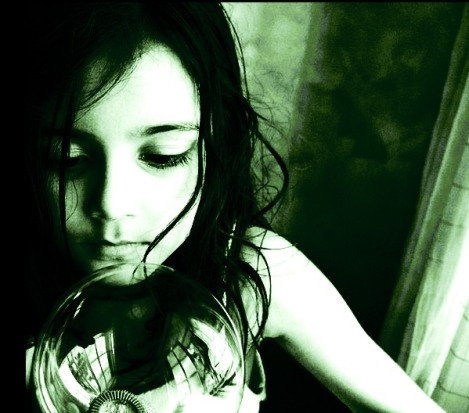
Original Image via Flickr Creative Commons, courtesy of Anurag Agnihotri
Last time we talked a little about our author brand and why, these days, our brand is almost as important as the books we write. It is an awesome time to be a writer, but also a scary one. Why can’t it be like the good old days when all we had to do was write the book?
Because that world no longer exists and, frankly, it wasn’t all that great to begin with.
Granted, in the pre-digital publishing world we authors didn’t need to tweet or blog or be on-line, but it was also a world with a 93% failure rate. According to the Book Expo of America, as late as 2006, 93% of all books (traditionally and non-traditionally published) sold less than a 1000 copies. Only one out of ten traditionally published authors would ever see a second book in print.
These days, anyone can be published. This is good and bad and we can talk about that another time. But with more titles than ever before and bookstores becoming an endangered species? Our brand is our lifeline. Whether we decide to self-publish or traditionally publish is a business decision only we can make, but we still must have a viable author brand if we hope to sell books.
So What is a Brand?
There are all kinds of answers to this question, but my answer is the correct one :D .
A brand is when a name alone has the power to drive sales.
In an age where we are deluged with choices, consumers are relying more and more on brands. We rely on a brand because the NAME comes tethered to a promise. There are 753 brands of cereal, but we trust Cookie Crunch…okay, Cheerios.
Author brands aren’t as impersonal as selling cereal, but the idea is similar. In a sea of infinite choices, who do we trust to provide an enjoyable experience?
Brands take time to create, but my way is fun. As I mentioned last time, I have ZERO interest in turning any of you into mega-marketers. I know you didn’t take up writing about spaceships or unicorns or unicorns on spaceships just to hold you until you could land that dream job selling life insurance.
Today I am going to let you into how I teach branding. I’ve never blogged about this before namely because while it isn’t complicated, it IS complex. I go into far greater detail in my book Rise of the Machines—Human Authors in a Digital World.
In the book I also show you step-by-step how to create your own unique brand. Not meaning to hawk a book, but I can’t have this blog be 20,000 words so if you desire more “meat” than what is in this blog, y’all know where you can find it ;) .
Moving on…
How an Author Brand WORKS
In the “olden days” before Instagram and Twitter and YouTube, the only way a novelist could build a brand was through his/her books. Think about it. Why did we (fans) love these authors? Because we felt we were part of the worlds they created.
Dean Koontz, Anne Rice, Stephen King, Tony Hillerman, David Eddings, etc. were all a part of my teenage world. They brought me love, pain, fear, resolution through their characters and stories. By getting to know the author’s characters I felt I knew the author and became emotionally bonded TO that author through story.
If you need a refresher on how that works, go re-watch Misery.
Come on! Admit it. There are some authors you would really creep out of they met you ;) .
*Drives car over Kardashians because OMG!!!! DEAN KOONTZ!*
When I decided to be the social media expert for writers, I spent over two years studying successful brands. All types. What made a brand iconic? I studied movies, fashion, soda, cars, authors, and pop phenoms.
I also studied the neuroscience behind branding. What made content go viral? Was there something about content that the human brain reacted to positively or negatively? Was all content equal? (NO) Was some content actually damaging? (YES) Is some content WAY better? (YES). I became a student of human behavior and created a step-by-step plan for writers to recreate that magic.
But for the purposes of today’s blog…
Like successful fiction, a successful brand must be HIGH CONCEPT. High concept is RIGHT-BRAINED. It is visceral and emotional.
Authors are in the business of selling feelings. It’s what we do with stories. We sell love, action, adventure, community, and happy endings.
Virtually all successful stories on the page and on the screen have harnessed what is called “high concept.” The reason Titanic was one of the most successful movies of all time is because it was “high concept”. It wasn’t a story about a doomed ship, it was a story about LOVE.
And we hear this term “high concept” in writing class, but what the heck is it?
High Concept has THREE Components:
Universal
Emotional
Gives the Audience Something to Contribute or to Take Away
If virtually every successful story/movie is high concept, doesn’t it make sense that our brands should be high concept, too? We don’t write novels with titles like:
The Virtuous Semicolon
The Sentence that Kept Running
That Amazon Prime Harlot
The Dangling Participle *RAWR*
If we write books about love, why are we trying to connect with “readers” by lecturing them about punctuation?
Writers have the power to create interstellar dynasties and invent entirely new species. With various combinations of 26 letters, writers can travel in time, rewrite history or wipe out a planet, a solar system a universe. But, the second they start a blog? Tweet? Get on Facebook?
All they can talk about is writing.
*head desk*
Why does all this talk of “writing” fizzle? Because “writing” is not high concept.
Trust me, readers do not give a crap about three-act structure unless we screw it up. Readers don’t care about Amazon vs. Smashwords, why we love the Oxford Comma, or how to write deep POV.
Does this mean we can’t blog about writing at all? NO. There is a difference between writing a blog about writing and creating a writing blog.
Even though I teach writing, this is not a writing blog. This is Kristen Lamb’s blog. Yes, I blog about writing and social media, but I have also blogged about zombies, my addiction to Febreze, being ADD, why I hate skinny jeans, and how to deal with bullies. And, frankly, those were the posts that went viral.

OMG!
Blogging only about writing will wear you out. And the real bummer?
Articles, interviews, and reviews are all informational. This is LEFT-BRAINED content. If all we are posting is left-brained content, we have a left-brained brand. Thus I posit this:
Why are you trying to sell a right-brained product with a left-brained brand?
Writers cannot fathom why a funny kitten meme gets 50 likes, 6 shares and 17 comments, but then a post about their upcoming release gets crickets.
Which topic is high concept (right-brained)?
Is a kitten universal? Yes! People in Japan actually pay money to pet adorable cats. Are kittens emotional? Yes! If you don’t smile looking at this little guy, you likely have no soul…
Does a funny kitten meme allow others to contribute or to take something away? Yes! Odds are, you will get all kinds of comments with people sharing about their pets. Oh, Fluffernutter used to do the same thing!
Does a cute kitten meme offer something to take away? Yes. It brightened our day, so we pass it on.
Now, if I post about a new book I have coming out, is that universal? No. Is it emotional for anyone but me and my mother? Not so much. Does it offer you anything to contribute or take away? Eh, not really.
And before anyone blasts me that sharing cute kittens isn’t “real” branding activity, we need to remember that we are no longer in a world of traditional media. Yes, we need to mention that book for sale, but if it is all we talk about? It turns people off. It is also making our brand reliant on content few people will share.
Hey, my new book “Sexy in Sneakers” is now available! PLEASE SHARE.
Yep, right on that. Not.
But, if most of the time we post fun stuff others enjoy, when we DO post about a book, others are more open to doing us a solid.
Remember, when it comes to social media, content that goes only ONE direction is already dead.
If I share something in a blog on Twitter or Facebook and no one else shares? My reach is limited to the people who are following me. Social media has the best impact when content goes VIRAL. This means lots and lots of other people want to share my content.
Guess what the most likely content to go viral is?
High concept ;).
See, you guys are smart!
This is why my kitten friend above has almost a million views.
We can talk about having a new book out just like we can feel free to blog about three-act structure. But, since these topics are NOT high concept, they will never ever go viral.
Ever.
We can post this kind of stuff, we just know not to camp on it.
Remember, name recognition alone is meaningless. A name only truly holds power once we tether it to an emotional experience. Which means…
Welcome to High Concept Branding
The key to creating a strong author brand is to understand what we are trying to create. We are creating a positive emotional experience and then tying that experience to OUR NAME.
Do this enough and eventually our name alone will have the power to drive sales. Btw, that is called an author brand ;) .
If we are able to produce content that 1) resonates with a wide audience 2) creates a positive emotional experience 3) by nature engenders sharing behaviors, we can do a lot more with a lot less. This also elucidates why ranting, name-calling, hyper-politicization, and spam are all behaviors that can and will tank a brand.
We will talk on this more later, but I will say that it is possible to have political, religious and social beliefs without giving everyone who sees our name indigestion. Remember we want to create a positive emotional experience. This is what ALL successful brands do. Apple, Coca Cola, Corvette, Levis, Harley Davidson, Hershey’s and on and on and on. ALL good brands capitalize on emotion. ALL strong brands use high concept.
Soap companies don’t have a thirty-second commercial about the merits of good hygiene, they show a woman moaning in the shower and having an “organic” experience. Thus, if every single successful brand is relying on the holy trinity of high concept, why are authors still spamming about their books and then confused why badgering strangers for money doesn’t work?
One Last Thing
Aside from possibly going viral, brands built on emotional connection have one major advantage—LONGEVITY. Since our brand is based on relationships and not algorithms, it is far more resistant to change. Facebook can go away and twitter can flitter and your brand will be just fine. I had Shingles and was down for MONTHS. The reason I still had a strong brand when I returned? I built it on people.
I hope this has made you feel less intimidated about creating your own author brand. We writers tend to overcomplicate stuff. A platform isn’t built overnight, but it also isn’t terribly hard. And yes, platforms built on simply sharing funny cat pics are stronger than you might have realized.
What are your thoughts? Do you now see this high concept pattern in your own behavior? The stuff you enjoy sharing? The content that gets the most interaction from others? Did the clouds part and angels sing now that you know why that dog-shaming meme scored WAY more likes than your thoughtfully crafted book review?
I LOVE hearing from you!
To prove it and show my love, for the month of SEPTEMBER, everyone who leaves a comment I will put your name in a hat. If you comment and link back to my blog on your blog, you get your name in the hat twice. What do you win? The unvarnished truth from yours truly. I will pick a winner once a month and it will be a critique of the first 20 pages of your novel.
For those who need help building a platform and keeping it SIMPLE, pick up a copy of my latest social media/branding book Rise of the Machines—Human Authors in a Digital World on AMAZON, iBooks, or Nook.



